
A cover letter for your CV, or covering note is an introductory message that accompanies your CV when applying for a job.
The purpose of the cover letter is simple… Persuade the reader to open your CV.
Learn how to write a cover letter properly, and you will hugely increase your chances of getting responses and landing job interviews.
This guide, with 12 annotated cover letter examples will show you everything you need to know about creating a winning cover note.
This annotated example of a cover letter shows you how you should structure your cover letters, and the type of information you should be including.
You should always write your CV in the body of your email (or job site messaging system) so that it can be read instantly. Never attach it as a separate document, or the recipient probably won’t open it.

These 11 example CV cover letters from a range of industries should give you some good inspiration for creating your own cover letter.
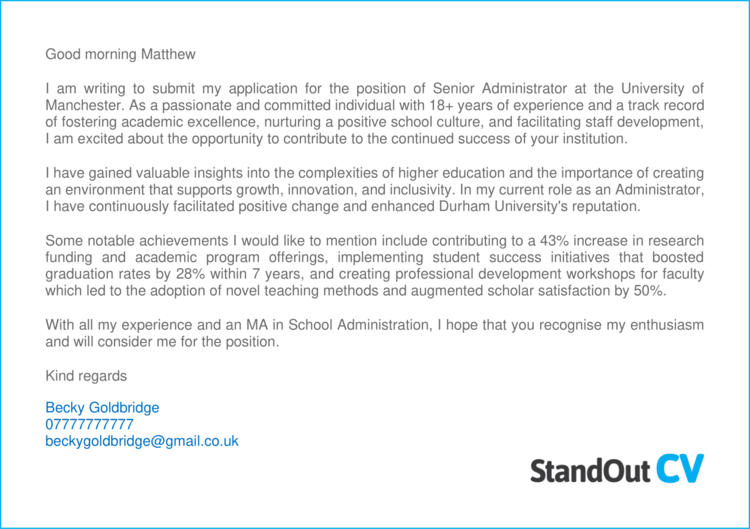
This cover letter is aimed at administrative roles, so it highlights the candidate’s abilities in efficiency, report writing and meeting deadlines, whilst demonstrating the types of environments they have worked in.
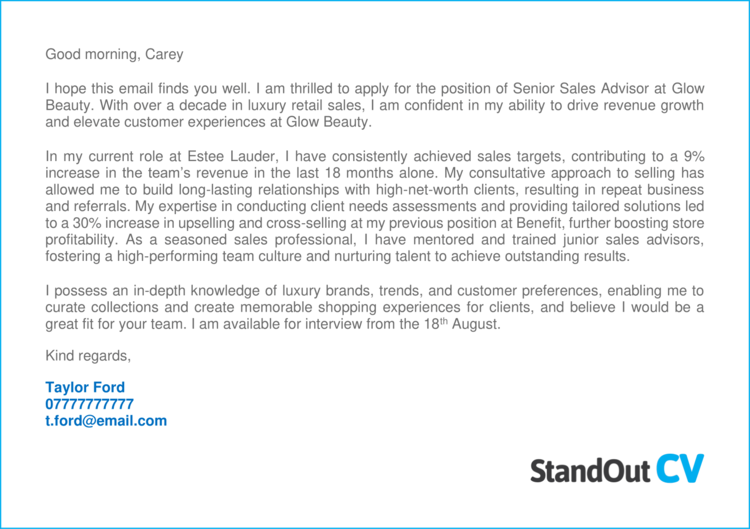
This customer service cover letter briefly explains the candidate’s length of experience in the field and highlights some of the more important customer service skills such as call handling, order taking and complaint resolution.
This gives the reader an excellent introduction to the candidate and should certainly encourage them to open the CV.
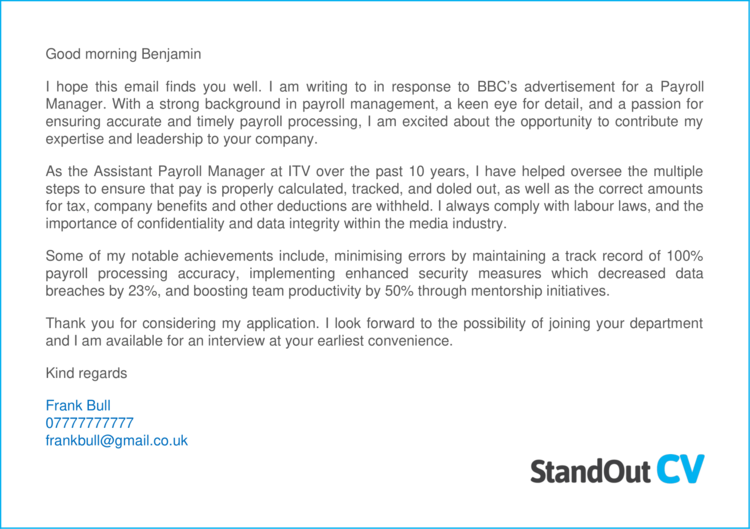
As a finance professional, it’s important to highlight your specialisms within finance, the types of companies you’ve worked for, and high level functions you’ve carried out within your cover letter. This will give the hiring manager a good overall feel of your abilities, and if it’s well tailored to the role, should provide them with enough info to excite them about your CV.
Quick tip: Use our job application tracker spreadsheet to track your applications and follow up with employers who don’t respond.


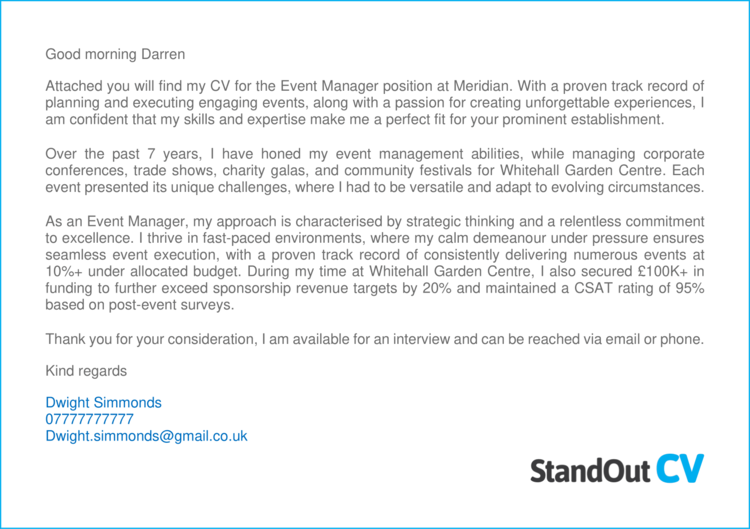
This events manager candidate has done a great job of summarising the type and size of events they manage, along with details of core skills such as leadership, project delivery and stakeholder management.
This certainly provides enough info to create a buzz around the CV attached and encourage the recipient to open it.
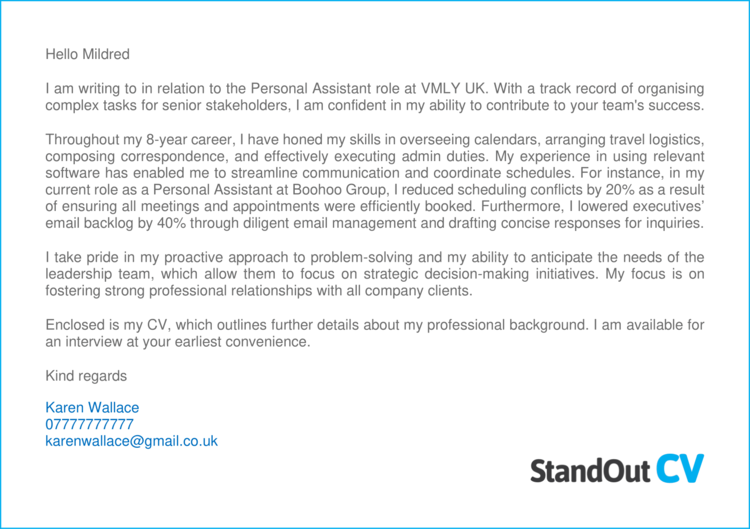
This executive assistant CV cover letter provides a good high level intro to the candidate showing the reader key business support knowledge in areas such as admin, diary management and document management. It also shows that the candidate is confident supporting senior business figures.
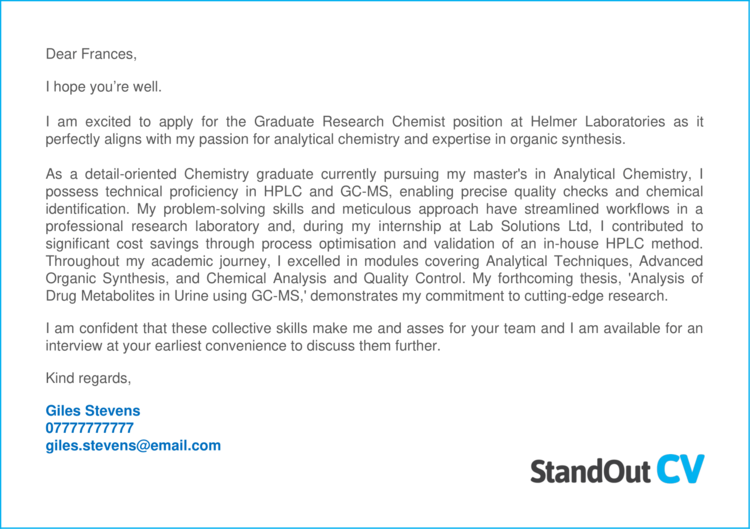
As a graduate, your cover letter will need to be a little longer than an experienced candidates, to compensate for your lack of experience and really sell yourself.
This candidate speaks in lots of detail about their education, qualifications, and extra-curricular work which relates to the roles they are applying for.
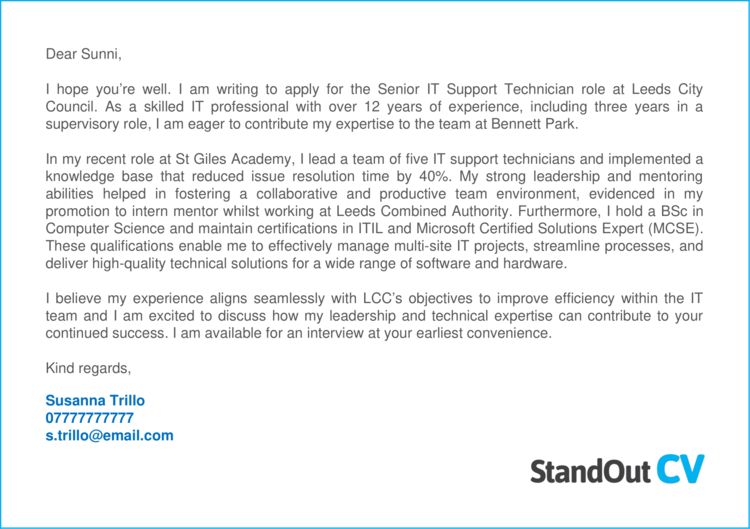
As an IT candidate, it’s important not only to highlight your technical skills, but also show how you apply those skills in the workplace to translate real benefits for your employer.
This candidate gives a good overview of the candidates technical abilities and the types of projects they apply them to, along with results they achieve.


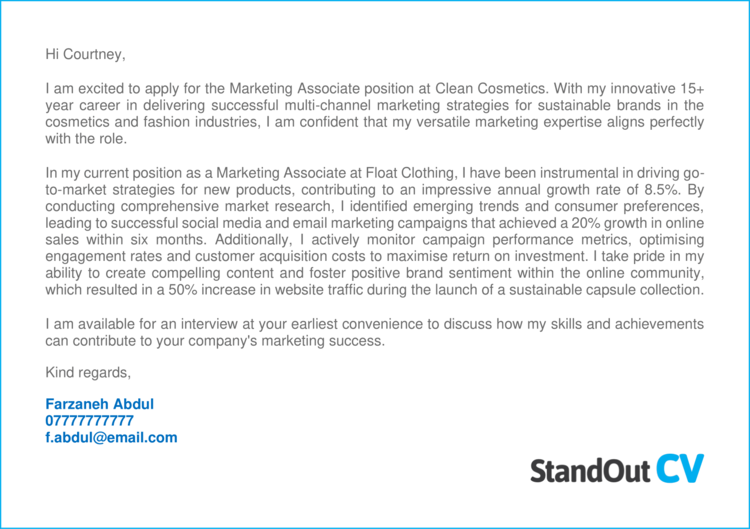
This marketing cover letter provides readers with a summary of the candidate’s core marketing abilities such as media planning, brand awareness and cost reduction. It also explains the types of marketing campaigns and companies they have experience with – a great high-level intro.
Cover letter examples

A project manager’s cover letter needs to quickly explain to recipients the types of projects they lead and the technical expertise they bring to the projects. It’s also important to describe level of experience, seniority and background.
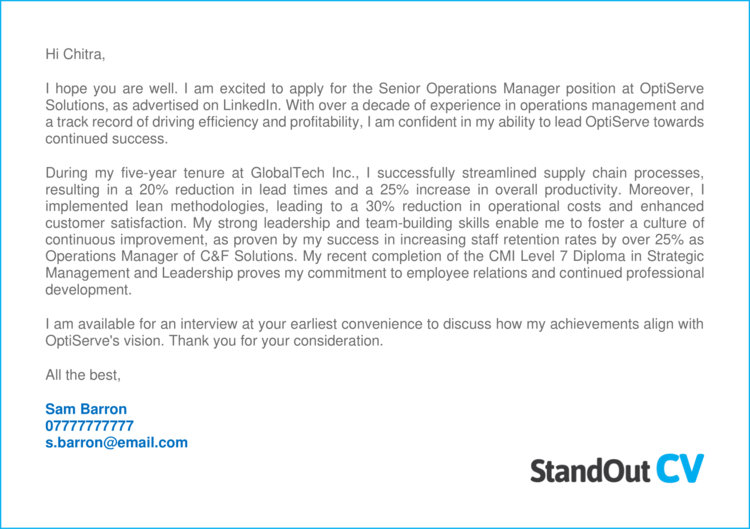
This operations management CV provides a brief introduction to the types of operations the candidate manages and the firms they work for.
They also touch upon some core operations skills such as efficiency, logistics and ROI improvement.
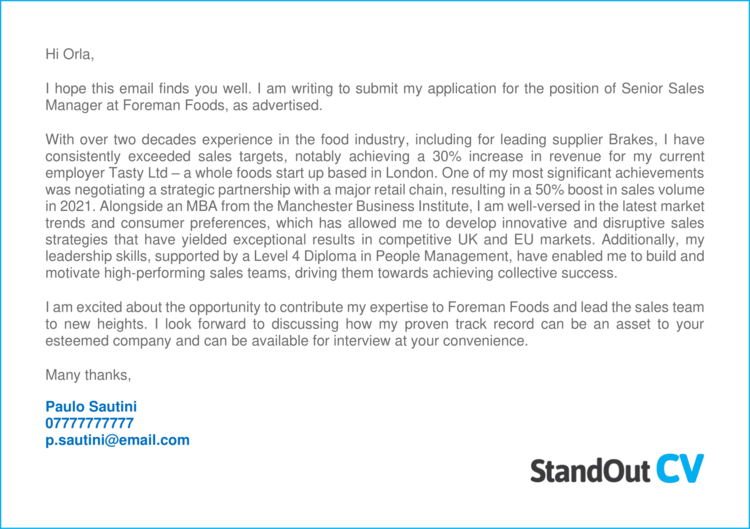
As a sales candidate, this cover letter shows the types of business this person can generate and the size and scale of the impact they create by highlighting some sales results.
It also mentions some core sales skills like business development, presenting, working under pressure and closing deals.
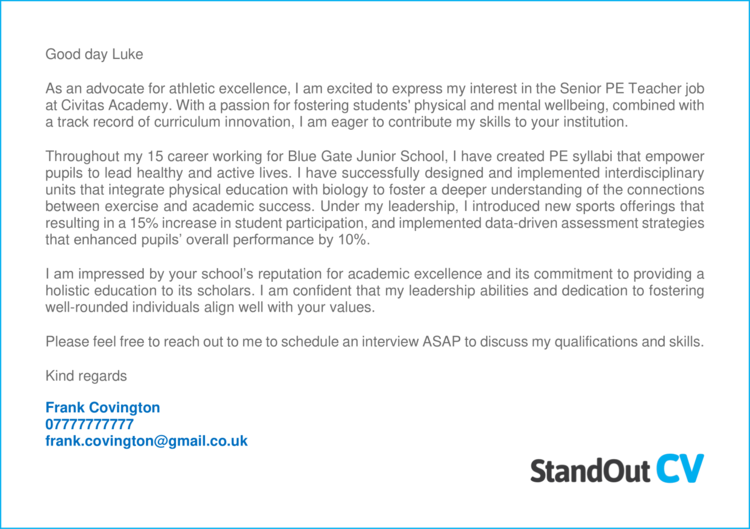
This teacher cover letter does a great job of introducing the candidate, and showing the recipient the key facts they will be looking for, such as; the age group they teach, subject specialisms, and the results they have achieved.
The cover letter is brief and gets to the point quickly, so that readers will instantly look to open the attached CV.
Now that you’ve seem good examples of cover letters to accompany your CV (or resume if you are in the USA) this guide will show exactly how to write your own, and the content that needs to be included.
When applying for jobs online you usually have 2 choices…
1) Send a message via the job website’s messaging system
2) Send the recruiter an email directly
If you can find an email address for the recruiter, then I would always recommend sending an email directly because it gives you more control.
When you send a message through a job website, it will transfer into an email with basic formatting and an auto-generated headline, which will look like this when the recruiter receives it.

If you cannot find an email address for the recruiter on the job advert, then try searching LinkedIn or the company website to find the relevant contact.
You may not always be able to find an email address, but when you can – always send a job application by email.
As you can see in the picture above, a bad subject line can kill your chances of actually having your email read in the first place.
Your subject line should stand out and give the recruiter a reason to open your email.
When recruiters look into their inbox, they are looking for one thing; a candidate who can do the job they are advertising – so give that to them in your subject line.
Your subject line should be a short summary of your experience that relates directly to the job you are applying for.
The following are good subject line examples;
KS2 Teacher with 5 years experience
Front End Web developer with HTML, HTML & JavaScript experience
Junior Graphic designer with 1st BA Hons Graphic Design
If your subject line shows that you have one or two of the most important requirements for the job, your email should get opened every time.


 Address by name" width="2457" height="568" />
Address by name" width="2457" height="568" />
To get the relationship off on the right foot, you should try to address the recruiter by name if you can.
Often the recruiter’s details will appear on the job advert but sometimes you may have to check out the company website or do some digging around on LinkedIn.
If you really can’t find the name, then it’s not the end of the world – just start with a simple friendly opening like “Hi”
(If you applying to a more traditional organisation such as an academic post for a university, you may want to use something a bit more formal like “Dear sir or madam”)
It’s important to sound professional when writing a cover letter but you also need to demonstrate your ability to communicate with other people and show some personality.
If your email is too casual and written in an over-familiar tone, then you will come across us un-professional.
But on the other hand, if your email is too formal and shows no signs of rapport building, you risk appearing as somebody who lacks social skills.
So when writing your cover letter, try to strike a nice balance of professionalism and friendliness.
Opening with a line such as “hope you’re well” is a nice way to breathe a bit of personality into your cover letter.
Ensure that your spelling and grammar is perfect throughout your cover letter because sloppy mistakes are a huge red flag for recruiters.
Quick tip: If you struggle with spelling and grammar, try our quick-and-easy CV Builder
Unless the job advert specifies otherwise; keep your cover letter short and sweet.
Recruiters and employers receive hundreds of job applications per week, so they don’t want to read a 2 page cover letter.
Depending on the role, around 2-4 sentences should be enough for the content of the cover letter.
You just need to write enough to persuade them to open your CV – It should roughly contain the same amount of information as your CV profile or personal statement.
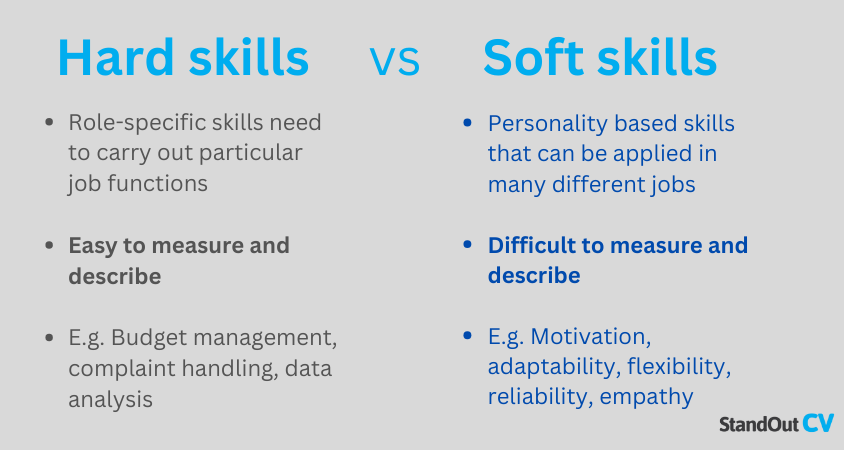
To ensure that recruiters open your CV, you simply need to explain how your skills and experience match the job requirements from the advert.
Scan the job advert to discover what the most important candidate abilities are, and show how your previous experience has prepared you to cover these.
In particular, look out for any requirements that are essential to the job.
Focus on what you have to offer at this stage and not what you want.
At this stage, your covering letter is simply a means of getting the recruiter to open your CV, so it’s too early to talk about salary demands etc. Save that for your initial conversation with the recruiter.

End your cover letter with a friendly salutation such as “Regards” and a smart signature which includes your name and most direct contact method (usually mobile phone for most people)
A professional email signature will show recruiters that you understand business-email etiquette and ensure they have a means of contacting you – even if they can’t open your CV for any reason.
Hopefully this guide has given you everything you need to create a winning cover letter that will ensure you CV gets opened every time you send it.
Just remember to keep it brief, be friendly, tailor it towards your target role, and give recruiters some good reasons to be interested in you.
Good luck with the job hunt!